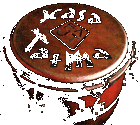|
|
|
He bangs, thwacks, rattles, pings and bongs; squeaks, slaps, jangles, jingles and jams; he uses electronic static and sound loops; he uses a drumstick, a hammer, a hand, empty cigar tubes, bells, party noisemakers, drinking glasses, duck calls, squeaky toys, a wind-up toy elephant with a drum, a self-made "sound wheel." wood or his own head often repeating a certain tone or rhythm until it has been exhausted or opens a door to another sound or rhythm. For Pavel Fajt, the drum solo is an art form. The great bebop trumpeter Dizzy Gillespie once said that the future of jazz was to return to its origins: "a man beating a drum." What he meant was that music is continually refining itself, moving toward its sources. And the source was a man with stick and a beat. It's likely that all music stems from the same Stone Age swinger, a dreamer who started beating a stick against I just use an object, I just take it with me and beat it; if I like it, I keep it, if not, I try it again and again, and maybe I start to like it and then I keep it; if don't like it, I kick it out. The Brno-born Fajt (pronounced fight) works at that horizon where sound is transformed into music: "My music world is the sounds," At 40, Fajt has been leading figure on the Czech rock scene for almost two decades. He has performed with such alternative-music icons as violin prodigy Iva Bittová; he was founding member of the legendary group Dunaj, and now leads the band Pluto. Fajt's thirst for breaking new musical ground remains unquenched, however. But, like Dizzy, he seeks the future in the past, the new in the old. In fact, Fajt may very well by Dizzy's man of the future, the "man beating on a drum." Nowhere is this more apparent than in his solo performances, where he creates music out of repeated rhythms and percussive sounds. The impression is of someone experimenting with sound and rhythm, playing a sound to explore it, as if hearing it for the first time, just as the First Drummer must have experimented with the possibilities of his discovery. In fact, Fajt's solo performances are I think that each sound is connected with the time, with the space, with the rhythm and with your feelings, so there are a lot of things on one point; if I play a rhythm at home that I like, it can happen that I play it in another room or another drum and it's nothing - it's always connected with the when. A solo performance is always about 80 percent improvisation, Q: Do you sometimes just go into your fantasy so much that you forget about everything else? A: That's the best for me, but it doesn't happen. Q: And do you ever find yourself going the other way, that you think so much about responsibility that you play Fajt's solo career began four years ago when he was invited to participate in a festival for solo performers in Geneva. He asked the festival organizers to provide him with a "graphic score." He recalls: "They made pictures, and I played the concert to these notes, according to this score. This was my beginning with solos. It was nice. It was funny." Pavel Fajt names as his musical inspirations the Police, Robert Fripp, Brian Eno, Fred Frith and current Laurie Anderson drummer Joey Baron. And, especially, ethnic music. What attracts him to ethnic music, he explains, is that "there is no wrong note in it, it's without calculation. The music made today is too young, it's like young wine somehow, a lot of notes that are not perfect." Because of the creative demands of his solo performances and his numerous duets, such as with the American percussionist Jim Meneses, Fajt needs the relative stability of a rock'n'roll band. It's too late for Fajt to duo with his musical partner of choice, Louis Armstrong. But he still looks forward to playing some day soon with Fripp and Eno. That's why Fajt is eager to go abroad, to work especially with musicians in England and the United States. This means that those who haven't caught him yet, either solo or with Pluto, should take advantage of the next opportunity. Because Even if I don't like some music, I like the truth [in it] because it's the essence, and it inspires me to find the essence in myself. The end. |
|
|
|
Pavel Fajt:
The music of sound By Siegfried Mortkowitz The Prague Post February 1998 
percussion, n.-[L. percussio < percussus,
pp. of percutere, to strike < per-, Per + quatere, to shake] 1. the hitting or impact of one body against another, as the ham- mer of a firearm against a cap 2. the shock, vibration, etc. resulting from this. (Webster's New World Dictionary)
Make it new. (Ezra Pound)
It is now pitch dark.
Slowly and with patience Search for its heart. You will need To crawl far into the empty heavens To hear it beat. (Charles Simic, from "Dismantling the Silence") |